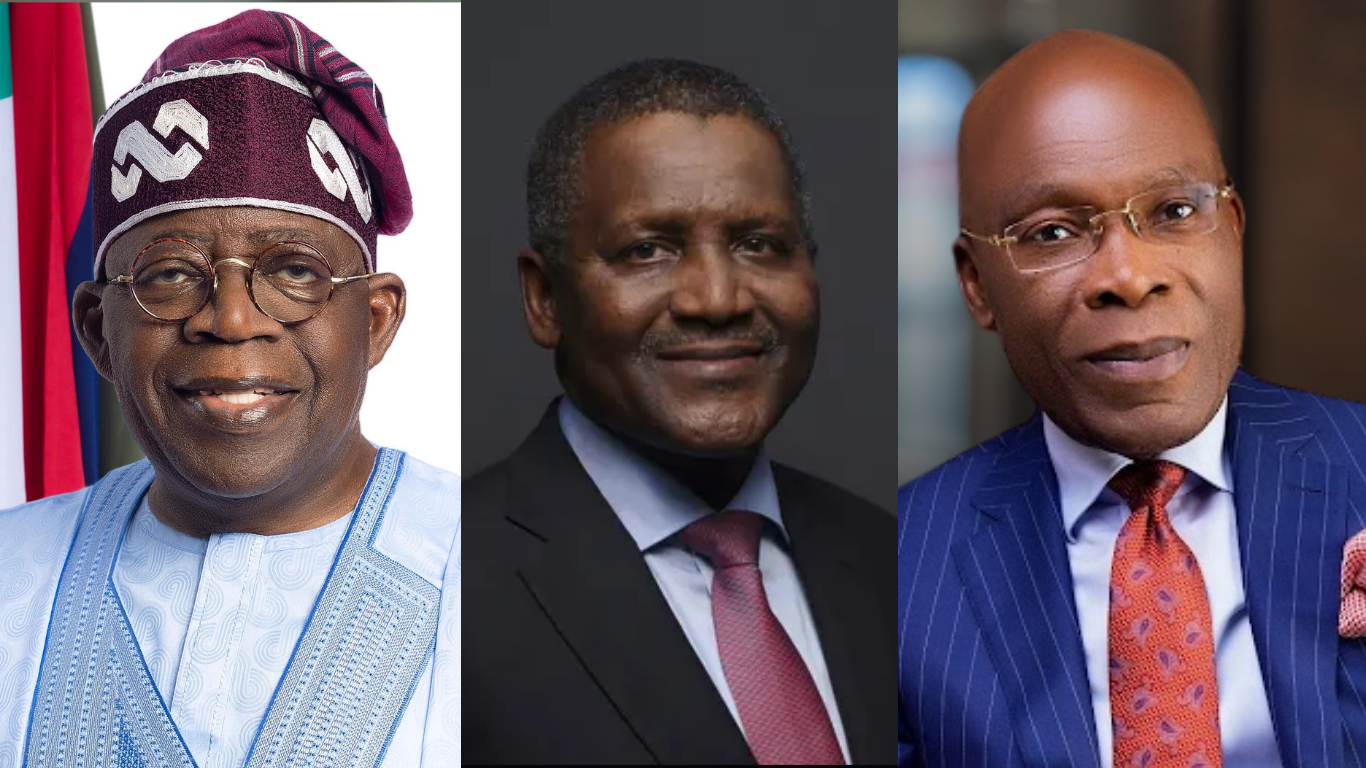$1 Trillion Economy: Why Tinubu Must Heed Dangote, Ekeh, and Other Indigenous Leaders
Abuja, Nigeria – July 29, 2025 – President Bola Tinubu’s ambitious goal of transforming Nigeria into a $1 trillion economy by 2030 has sparked widespread discussion, with prominent business leaders like Aliko Dangote and Leo Stan Ekeh offering critical advice to ensure its success. Their recommendations, centered on protecting local industries, boosting infrastructure, and enforcing a “Buy-Nigeria” policy, are seen as vital to overcoming Nigeria’s economic challenges and achieving this audacious target.
Tinubu’s Vision and Economic Context
Tinubu’s “Renewed Hope Agenda” aims to nearly triple Nigeria’s GDP from its current $384 billion to $1 trillion by 2030, a goal that requires an average annual growth rate of over 20%. Recent reforms, including fuel subsidy removal, naira devaluation, and foreign exchange liberalization, have restored some investor confidence but also triggered a cost-of-living crisis, with inflation hitting 33.4% in July 2024 and the naira depreciating to over N1,600 per dollar. The National Bureau of Statistics (NBS) reported a GDP growth of 3.19% in Q2 2024, far below the pace needed, though an ongoing GDP rebasing exercise could push the baseline closer to $600 billion, making the target more feasible.
Dangote’s Call for Local Industry Protection
Aliko Dangote, president of Dangote Group and Africa’s richest man, has been vocal about the need for policies that shield indigenous industries. Speaking at the Nigeria Manufacturers’ Summit in Abuja, he criticized government policies that allow unchecked imports of goods and services already produced locally, which he argues stunts the growth of Nigerian businesses. His $20 billion Dangote Refinery, a cornerstone of Nigeria’s push for self-sufficiency in petroleum, exemplifies the potential of local investment. Dangote praised Tinubu’s Naira-for-Crude initiative, which mandates crude oil transactions in naira, reducing forex pressure and enabling his refinery to meet domestic demand while targeting West African markets. “For us to effectively meet market demand, crude must be priced and purchased in our local currency,” he said during a visit by Minister of Industry, Trade and Investment, Dr. Jumoke Oduwole, to his Lagos facility.
Dangote also highlighted the One-Stop Shop (OSS) initiative, which streamlines coordination among regulatory agencies like the Navy, NIMASA, and NPA, reducing operational bottlenecks for businesses like his refinery. He urged Tinubu to replicate this model across sectors to enhance efficiency and attract investment. With the refinery projecting a $30 billion turnover in the next two years, Dangote’s success underscores the need for government patronage of local players to drive economic growth.
Ekeh’s Push for Infrastructure and Anti-Blackmail Measures
Leo Stan Ekeh, chairman of Zinox Group, an African ICT unicorn, emphasized that Nigeria’s chronic power shortage—averaging four hours of electricity daily according to NBS data—severely hampers industrialization. “The current state of power delivery cannot support the bullish industrialization needed for a $1 trillion economy,” Ekeh stated in an open letter to Tinubu. His Computerise Nigeria project laid the foundation for digital hubs in tertiary institutions, transforming sectors like education, banking, and agriculture. Yet, Ekeh has faced “serial blackmail and corporate bullying” from fringe private sector players and public officials, a challenge he says stifles local innovators.
Ekeh advocates for a robust “Buy-Nigeria” policy, particularly among government agencies (MDAs), to prioritize indigenous manufacturers and service providers. He argues that protecting proven local companies and categorizing their assets as national treasures would boost confidence and attract foreign investment. “The way we treat our local investors will determine how many foreign investors we can attract,” he noted, echoing Dangote’s call for deliberate government support.
Broader Industry Support and Policy Recommendations
At the inaugural Domestic Investors Summit in Abuja, Dr. Jumoke Oduwole outlined 2025 targets to support Tinubu’s vision: $6 billion in foreign direct and portfolio investment, $6.5 billion in non-oil exports, a 20% increase in trade value, and 200,000 export-led jobs. These align with Dangote and Ekeh’s emphasis on local production, with Oduwole stressing the “Nigeria First” policy to prioritize domestic businesses. The summit facilitated policy co-creation with investors, resulting in commitments exceeding $50 billion, signaling growing investor confidence.
Other indigenous players echo these sentiments, urging Tinubu to address systemic issues like insecurity, which deters investment and farming, and to stabilize the naira to curb inflation. A recent report highlighted that insecurity could jeopardize the $1 trillion goal if not tackled decisively, with Tinubu himself noting the need for a “conclusive victory” against security threats to free up resources for economic expansion.
Challenges and Criticisms
Despite optimism, Tinubu’s reforms have faced backlash. The African Democratic Congress (ADC) criticized his $21 billion foreign borrowing plan, approved by the Senate in July 2025, warning that Nigeria’s debt could exceed N200 trillion by year-end with little tangible progress in infrastructure or services. Human Rights Watch noted that the abrupt fuel subsidy removal and naira devaluation have deepened poverty, with no transparency on how savings are utilized, fueling public discontent and protests. Critics argue that without addressing power deficits, insecurity, and policy inconsistencies, the $1 trillion target remains elusive.
Path Forward
Dangote, Ekeh, and others offer a clear roadmap: protect local industries through patronage and policy, invest in power and infrastructure, and curb corporate blackmail. Tinubu’s administration must balance bold reforms with measures to ease public hardship, ensuring growth is inclusive. The Dangote Refinery’s potential to make Nigeria a West African petroleum hub and Zinox’s digital innovations highlight the transformative power of indigenous investment when supported by government action. As Ekeh stated, “A $1 trillion economy is possible, but only with deliberate policies that prioritize Nigeria’s own.”
This article draws on insights from National Accord Newspaper, Business Post Nigeria, and posts on X. For further details, visit statehouse.gov.ng or follow ongoing discussions on X.
